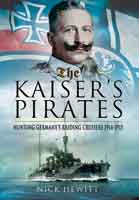Unlike her long established rival, at the start of hostilities the German navy was a young arm short on traditions and heritage. The Kaiser, looking greedily across the North Sea at the massive fleet he wanted to outdo, danced between adulation and loathing, intensely jealous of all the things his new navy lacked. How was this void going to be filled?
Nick Hewitt takes us on a series of stunning voyages of the Kaiser’s cruiser fleet as it set out to disrupt the commerce keeping Britain afloat. He allows the reader to become almost part of the fabric of these ships as they sailed to glorious destruction.The Germans had the men and the ships to rain havoc on the imperial trade routes and, for the most part, they did it with aplomb.
Those early years at sea were marked by examples of valour; ruthlessness and fortitude combined with a sense of chivalry it is hard to appreciate a century on. The German sailors were giants of their day; men I admire immensely for all their qualities. They created the heritage that was eagerly absorbed by Hitler’sKriegsmarine in later years and expanded on during the next war. The author reminds us how the post war Bundesmarine adopted the names of the cruisers for modern ships, perhaps the most basic and telling acknowledgement of a proud past in any navy.
The Kaiser’s proud ships swept the great oceans and did a lot of harm to the British economy. They made heroes of the men who sailed them and legends for themselves. They are a complete package – the real deal.
The British responded to the actions of the Kreuzergeschwader with a comparable mix of commitment, bravery and sacrifice.
There were battles and many good men died, including two fighting admirals – Kit Craddock and the Graf von Spee. Beautiful ships were lost but lasting reputations were made.
The story of the Emden ranging far and wide out in the vast Pacific and the dramatic battles of the Coronel and Falkland Islands where the Kaiser’s men bested a weaker British force and were then obliterated by the remorseless power of the Senior Service are told in a compelling manner. The author seems to love the sea and it’s war stories. He writes in an engaging style which I could read until the cows come home. This is the kind of history telling I like most; enthusiastic, heartfelt and thoroughly believable. Mr Hewitt builds a colourful picture of the bond between the captains and their crews, of eccentricities and adventures afloat. He introduces us to the fragile politics of the many countries where the ships made brief stops and opens a window on a lost world where Britain was the superpower ruling seas, hearts and minds in far off corners of your atlas. For all my pride in the Royal Navy it is to the Germans that I look for the likeable pirates of the book’s title. I have in my head the image of eager German mariners in the ports of South America eagerly taking the chance to do their bit for a distant fatherland by joining the crews of the cruisers themselves or the vessels they had taken as auxiliaries.
I’ve mentioned before the story of the clash between the Armed Merchant Cruisers Carmania and Cap Trafalgar, that almost unlikely encounter where the British ship fought a German foe disguised to look like it. The British Carmania won the day but this is just a statistic of a battle that claimed many lives. The book is not just about ships and tables of losses. It is about the people who made all this happen, often with tragic consequences for themselves.
The saga of the Konigsberg, trapped in East Africa, forms a major part of the story of the little known but terrible conflict on the continent, dwarfed by events at the heart of the war in Europe.
Here, the efforts the British made to sink the cruiser appear tortuous and although they prevailed, guns from the ship were taken ashore and used by the ingenious Paul von Lettow-Vorbeck and his army running rings around the imperial pack hounds of Britain and her allies. The canvas of Mr Hewitt’s history is vast.
The centennial retelling of the Great War will largely ignore the conflict at sea. Pen & Sword have produced a number of books in recent times that take us out into the salt spray and Lyddite haze leaving a feeling of complete connection with the men of all sides who fought their war a long way from mud and poetry. Their war will not be interpreted either by the well meaning or the malcontents who get airtime on the telly or column inches in the newspaper you leave on your commuter train seat.
The Great War at sea might just escape the blanket of nonsense washing over its landlubber counterpart. Keep your fingers crossed and read books like this one. It tells the story, pure and simple without a hint of bias. A breath of sea air will do us all good in the four long years ahead.
Reviewed by Mark Barnes for War History Online.
THE KAISER’S PIRATES
Hunting Germany’s Raiding Cruisers 1914-1915
By Nick Hewitt
Pen & Sword Maritime
ISBN: 978 1 84884 773 6
